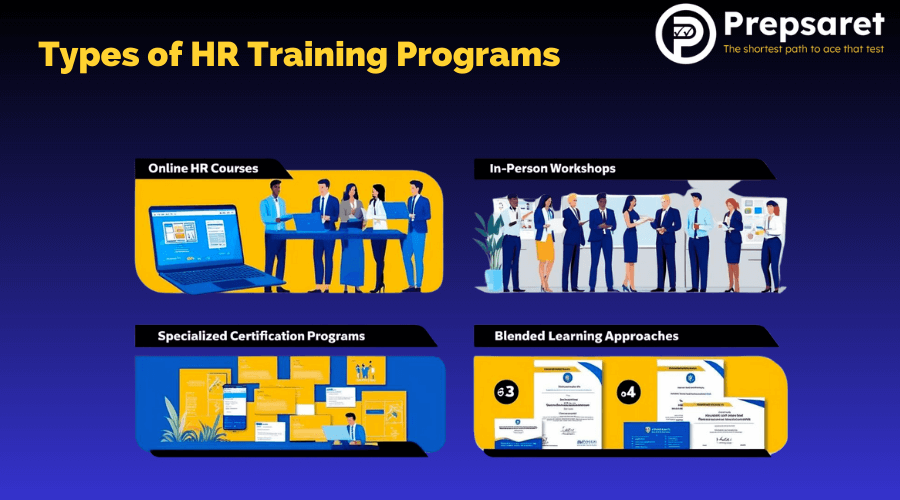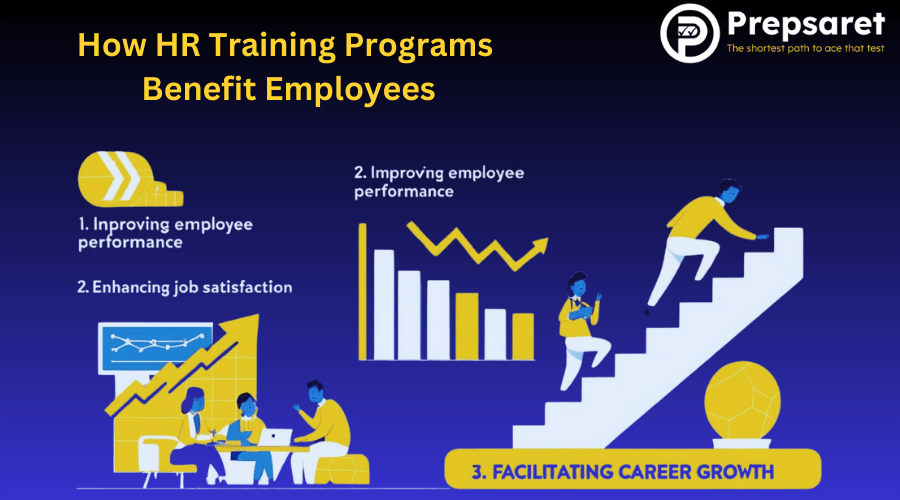HR training programs are a cornerstone of any successful business, as they equip HR professionals and employees with the skills and knowledge necessary to navigate the complexities of the modern workplace.
Whether it’s ensuring compliance with regulations, enhancing leadership abilities, or improving communication, HR training is critical for fostering a productive and efficient work environment.
For those searching for HR training programs, there are numerous options available, ranging from in-person workshops to local seminars. However, with the rise of remote work, many organizations are also looking at HR training programs for employees that can be done online, offering flexibility and convenience.
No matter the format, HR training plays a key role in boosting employee performance, reducing turnover, and ensuring that HR professionals are well-equipped to handle various challenges that arise in today’s dynamic work environment.
Investing in high-quality HR training helps companies stay ahead of trends and regulations while fostering a more efficient and engaged workforce.
HR training programs are diverse and essential for developing the skills of HR professionals and employees alike. Here are some of the best HR training programs available, focusing on various HR training topics that cater to different needs and preferences.
Types of HR Training Programs

- Online HR Courses
Many platforms offer online HR courses with certificates free of charge, making them accessible to a wide audience. These courses cover essential topics such as recruitment, employee engagement, and compliance training.
- In-Person Workshops
In-person training sessions allow for interactive learning experiences. These workshops often focus on practical applications of HR concepts, such as conflict resolution, performance management, and diversity, equity, and inclusion (DEI) initiatives.
Participants benefit from networking opportunities and real-time feedback from trainers.
- Specialized Certification Programs
Many organizations offer specialized certification programs that delve deeper into specific areas of HR. For example, the HR Certification Institute provides certifications that validate expertise in various HR functions, while Prepsaret focuses on offering online study materials for various HR certifications.
- Blended Learning Approaches
Combining online and in-person formats, blended learning provides flexibility while ensuring comprehensive coverage of critical topics. This approach allows participants to engage with theoretical content online before applying their knowledge in practical settings.
By exploring these options, organizations can find suitable HR training courses that align with their goals and the needs of their workforce. Investing in these programs not only enhances employee capabilities but also contributes to a more effective and engaged workforce overall.
Find out: How Do I Get SHRM Certified?
How HR Training Programs Benefit Employees

HR training programs for employees offer significant benefits, improving their performance, satisfaction, and opportunities for career advancement. These programs provide employees with the tools and skills needed to excel in their roles, whether they are learning the basics or developing advanced competencies.
Improving Employee Performance
HR training programs for employees equip them with the necessary skills and knowledge to perform their roles effectively. By focusing on HR training and development, these programs help employees understand their responsibilities better, leading to increased productivity.
Employees who receive proper training are less likely to make errors, as they are more proficient in their tasks. This proficiency not only boosts individual performance but also contributes to overall team efficiency.
Enhancing Job Satisfaction
When organizations invest in HR leadership training and other development opportunities, employees feel valued and recognized. This investment fosters a sense of loyalty and commitment, resulting in higher job satisfaction.
Employees who are confident in their skills are more likely to approach challenges positively, which enhances collaboration and creates a supportive work environment. Moreover, a culture of continuous learning encourages employees to engage more deeply with their roles, further improving morale.
Facilitating Career Growth
HR training programs also play a crucial role in career advancement. For those seeking HR training for beginners, these programs provide foundational knowledge that can lead to promotions and new opportunities within the organization.
As employees acquire new skills, they become eligible for more advanced roles, paving the way for career progression. Organizations that prioritize employee development often experience lower turnover rates, as workers are more likely to stay with companies that support their growth.
Find Out: Why Employers Prefer Candidates with SHRM Certifications
Finding the Right HR Training Programs
Choosing the right HR training programs is crucial to ensuring that your HR team develops the necessary skills and knowledge to succeed. With numerous options available, both online and in-person, selecting a program that aligns with your organization’s needs is key.
Here are some tips to help you choose the most suitable program for your specific needs.
Identify Your Career Goals
Before diving into available options, clarify your career objectives. Are you looking to specialize in areas like talent acquisition, employee relations, or HR analytics? Tailoring your search based on these goals will help you find relevant HR certification courses that align with your aspirations.
Assess Your Current Skills
Conduct a self-assessment to identify your strengths and weaknesses. This will guide you in selecting HR training programs for employees that address skill gaps and enhance your expertise in key HR functions.
Research Course Content
Look for programs that offer comprehensive and up-to-date content. Ensure the curriculum covers current trends, tools, and best practices in HR. Programs that include practical elements, such as case studies or practice questions, are particularly beneficial as they help reinforce learning.
Consider Format and Flexibility
Decide whether you prefer online HR training programs or in-person sessions. Online courses often provide flexibility, allowing you to learn at your own pace, while in-person workshops can offer more interactive experiences. Choose a format that suits your learning style and schedule.
Check Accreditation and Provider Reputation
Opt for accredited courses from reputable institutions to ensure the quality of training. Accreditation adds credibility to your qualifications, making you more attractive to employers.
Look for Networking Opportunities
Choose programs that foster networking among participants. Engaging with peers can enhance your learning experience and provide valuable professional connections.
Following these guidelines will help you effectively navigate the options available for HR training certification and find the right program that meets your professional needs and goals.
Free and Low-Cost HR Training Options

Free and low-cost HR training options can significantly enhance your skills without straining your budget. Here are some valuable resources that are affordable for HR education.
Free HR Training Programs
There are many platforms offering free HR training courses that cover key topics essential for HR professionals. Prepsaret is a highly regarded platform providing a broad selection of free online HR courses.
These courses cover important areas like recruitment, employment law, and talent retention, helping learners develop essential skills while earning recognized certifications.
This course is ideal for both beginners and experienced professionals looking to refine their skills .
Best Online HR Certification
Among the many options available, Prepsaret stands out as one of the best online HR certification programs. It not only offers comprehensive training across various HR topics but also includes free practice questions that help reinforce learning and prepare candidates for real-world HR challenges.
This feature is particularly beneficial for those new to the field or those preparing for certification exams.
Try out: Free SHRM Practice Questions for beginners.
HR Compliance and Legal Training
HR compliance training is essential for organizations to navigate the complex landscape of labor laws and regulations. This training equips employees with the necessary knowledge to adhere to legal standards, thereby minimizing the risk of legal issues and fostering a safe, ethical workplace.
Mitigating Legal Risks
One of the primary reasons for implementing HR compliance training is to mitigate legal risks. By educating employees about relevant laws, such as anti-discrimination statutes, workplace safety regulations, and data protection laws, organizations can significantly reduce the likelihood of costly lawsuits and penalties.
Employees who understand their rights and responsibilities are less likely to engage in behaviors that could lead to legal disputes or violations.
Creating a Positive Work Environment
Effective compliance training also contributes to a positive workplace culture. When employees are aware of compliance standards and ethical practices, they are more likely to foster an environment of trust and respect.
This not only enhances employee satisfaction but also promotes retention and productivity. Furthermore, a well-informed workforce can actively participate in risk management strategies, leading to fewer workplace incidents and a more cohesive team dynamic.
Ensuring Legal Protection
Regular HR compliance training ensures that organizations remain compliant with ever-changing labor laws. This proactive approach protects companies from potential legal ramifications that can arise from non-compliance, such as fines or reputational damage.
By investing in ongoing training, organizations demonstrate their commitment to ethical practices and employee welfare.
Advanced HR Training Programs for Experienced Professionals

Advanced HR training programs are essential for experienced professionals seeking to enhance their strategic capabilities and leadership skills. These programs focus on equipping HR leaders with the tools necessary to navigate complex organizational challenges and drive success.
Importance of Advanced HR Training Programs
As the role of HR evolves from administrative functions to strategic partnership, advanced HR training programs become crucial. These courses cover a range of topics, including:
- Strategic Workforce Planning: Aligning HR practices with business objectives.
- Leadership Development: Enhancing skills to lead teams effectively and manage change.
- Data-Driven Decision Making: Utilizing analytics to inform HR strategies and improve organizational performance.
Types of Advanced HR Programs
- Corporate HR Training Services: Many organizations offer tailored corporate training services that focus on specific company needs. These programs often include workshops and seminars led by industry experts, providing real-world insights and practical applications.
- HR Courses with Certification: Programs such as the Senior Professional in Human Resources (SPHR) and the Global Professional in Human Resources (GPHR) provide recognized certifications that validate advanced knowledge in strategic HR management. These certifications are highly regarded in the industry, enhancing career prospects for participants.
- In-Person HR Training Workshops: For those who prefer hands-on learning, in-person workshops offer interactive experiences that foster networking and collaboration among peers. These workshops often include case studies and group discussions, allowing participants to apply theoretical knowledge in practical settings.
Investing in advanced HR training programs is a strategic move for experienced professionals aiming to elevate their careers. Participating in these programs enhances skills and positions individuals as key contributors to their organizations’ success.
Through corporate HR training services or accredited certification courses, advanced HR education offers significant benefits, leading to improved leadership capabilities and strategic insight.
Benefits of HR Certification and Career Growth
HR certification plays a crucial role in career advancement and potential earning growth for professionals in the human resources field. As organizations increasingly recognize the value of certified HR practitioners, obtaining certification can significantly enhance an individual’s career trajectory.
Significance of HR Certification for Career Advancement
One of the primary benefits of pursuing HR certification courses is the increased credibility it provides. Certification validates an individual’s expertise in key HR areas such as employment law, recruitment, and organizational development.
Many employers prefer or require certified candidates for HR positions, particularly in leadership roles. This preference opens doors to new job opportunities and promotions, making certified professionals more competitive in the job market.
Impact on Earning Potential
Certified HR professionals often enjoy higher salaries compared to their non-certified counterparts. Studies indicate that individuals with HR certifications can earn 10% to 20% more than those without credentials.
This increase in earning potential reflects the value that employers place on certified expertise. Furthermore, certification can act as a catalyst for promotions, with statistics showing that certified professionals are significantly more likely to advance within their organizations.
Continuous Professional Development
HR certification is not just a one-time achievement; it requires ongoing professional development to maintain.
This commitment to continuous learning ensures that certified professionals stay updated on the latest HR trends and regulations, further enhancing their value to employers.
Networking Opportunities
Earning HR certification also connects individuals to a vast network of fellow professionals, providing opportunities for mentorship and collaboration. Engaging with this community can lead to valuable insights and support throughout one’s career journey.
Continue Reading: Is SHRM Recognized Globally?
FAQs
What Is the Best Training for HR?
The best training for HR includes a mix of foundational courses for beginners and advanced leadership programs for experienced professionals. Programs like SHRM-CP and AIHR's HR Manager Certificate are highly regarded for their comprehensive content and practical applications.
Which Certification Is Best for HR?
The best certification for HR varies by career goals, but the SHRM-CP and PHR are widely recognized as top choices. They validate expertise in core HR functions and are beneficial for career advancement.
What are the 7 HR Basics?
The seven HR basics include recruitment and selection, employee onboarding, performance management, training and development, compensation and benefits, employee relations, and compliance with labor laws. Mastery of these areas is essential for effective HR management.
How Do I Start HR Training?
To start HR training, begin by researching HR certification courses that match your goals. Consider enrolling in online programs or local workshops. Networking with professionals in the field can also provide valuable insights and guidance on your learning path.

